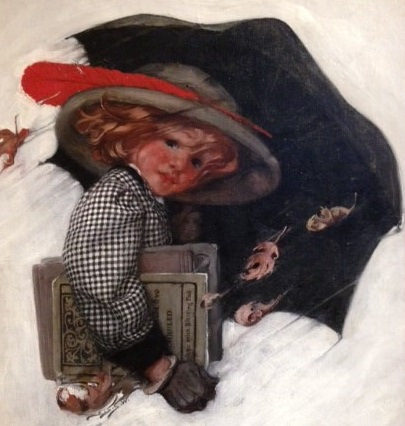Thoughts About Umbrellas
April 6, 2017
What is it about umbrellas that make them targets of unintentional acts of sharing?
I ask myself this after experiencing three different episodes this past month- during activities as a librarian--when a prized umbrella of mine was treated as if it could be 'borrowed.' Each time, the assumption came with no intention that the umbrella would be returned, but rather that it held immediate protective value on a rainy day for someone other than its owner.
The first two times occurred at restaurants that are restricted to members of an institute of higher education. Once I left my umbrella behind my coat at a self-serve coat rack at a faculty club, and the other time I checked the umbrella with my coat at a staffed coat room. I was stunned by the comments I received in both cases, as well as afterwards when mentioning the experiences to colleagues: 'Someone must have just borrowed it.' Why would anyone think to do that when clearly the umbrellas were not abandoned or labeled as 'help yourself,' nor did they have any emblem suggesting they were a promotional giveaway?

Sarah Stilwell Weber's cover illustration for the October 9, 1909 Saturday Evening Post.
The third time occurred on a station platform where I stood to catch a train to a lecture about the future of library buildings. A middle-aged man standing next to me eyed my newly replaced umbrella. It is a good imitation of my first ones--big, with a scientifically designed wind flap, rolled up into a sleek black walking stick. Brazenly, he asked me, 'Would you trade your umbrella for mine?' Little did he know of my obsession with holding on to my rain gear when I replied that I just could not part with this particular one. 'Why?' I asked him. 'Someone broke my handle,' he noted as he exposed his small and unkempt parasol.
I puzzled over what other objects our culture might view as valued beyond personal possession and shared for society's benefit. Of course information comes to mind. The more it is used, the better informed society is, or so goes our belief in the preparation of citizens in a democracy. Although libraries uphold freedom of information, the principle does not equate with practice that all information is available to everyone. Books once were prized possessions held by proud owners, and then libraries developed circulation procedures to manage many people systematically using a single copy. Even so, when a book disappeared, it was investigated as a theft, if not found to have been simply misplaced.
Nowadays the exchange of information has gone far beyond the confines of a physical object and is shared via the less visible internet and through a range of devices. With so many words available freely through a multitude of devices, information often seems open for anyone to read. Library systems have evolved to share access to licensed electronic resources but restricting access to some publications. It may seem at times confusing why a social entitlement for resources that is valued for all--whether on sunny or rainy days - are not there for the taking.
At just the point when my meandering correlations about umbrellas and information were exhausted, something else drew me to thinking about them together. This week I viewed the beautiful exhibit in the Paul Peck Alumni Center and saw Sarah Stilwell Weber's cover illustration for the October 9, 1909 Saturday Evening Post (shown above).
Like a good book, perhaps a good umbrella should also be freely shared; maybe it's time for our society to build the infrastructure for this public good.
Wishing April's showers bring you May flowers, along with some good readings.
Danuta A. Nitecki, PhD
Dean of Libraries